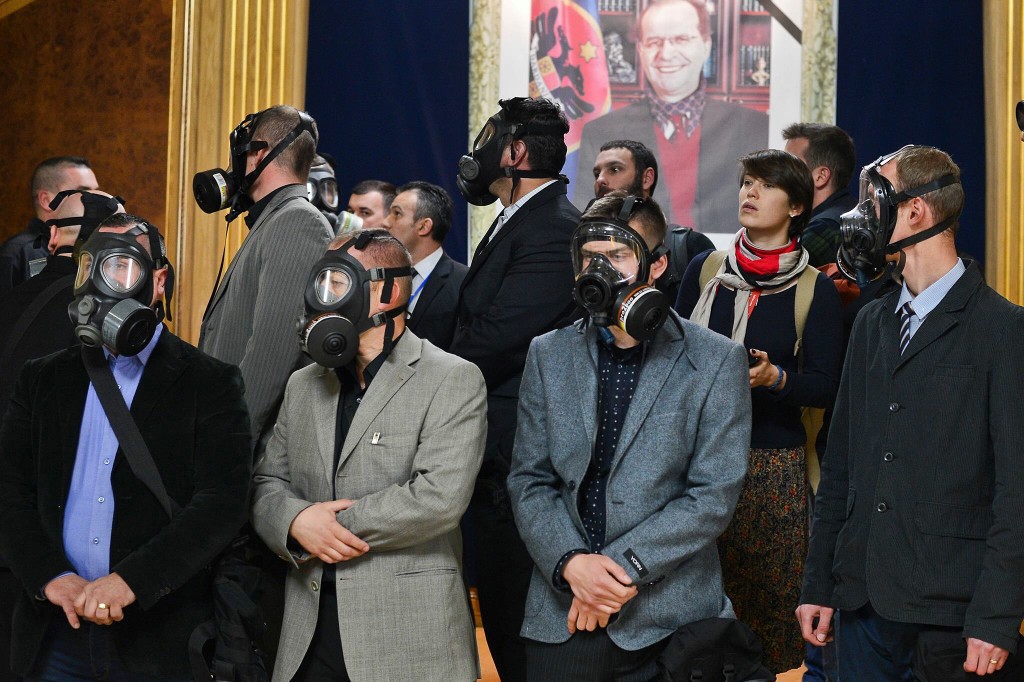
Valerie Hopkins, right, on assignment for The New Yorker at the Kosovo Assembly in February 2016 after opposition MPs released tear gas. Photo: Petrit Prenaj
Valerie Hopkins is a Kosovo-based journalist for the Balkan Investigative Reporting Network. She also freelances regularly from across the Balkans for Foreign Policy and Al Jazeera. Previously, she worked as web editor for the Organized Crime and Corruption Reporting Project in Sarajevo, Bosnia and Herzegovina. As a 2013 winner of the OPC Foundation’s Jerry Flint Internship for International Business Reporting, she interned for Thomson Reuters in Belgrade, Serbia. Before launching her career as a journalist, Hopkins worked for the Organization for Security and Co-Operation in Europe Mission to Bosnia and Herzegovina and for a boutique election law firm in Washington, DC.
Hometown: Washington, D.C.
Education: M.A. Politics, Columbia Journalism School; B.A. International Relations (Post-Soviet Studies), College of William and Mary.
Languages: English, Bosnian/Serbian/Croatian, Russian, Spanish.
First job in journalism: Reporting on trials from the war crimes chamber of Bosnia and Herzegovina’s state court for the Balkan Investigative Reporting Network.
Countries reported from: Russia, Ukraine, Bosnia, Serbia, Croatia, Macedonia, Slovenia, Kosovo, Montenegro, Belgium, Albania, U.S.A.
Year you joined the OPC: 2013.
Why are you drawn to reporting on the Balkans? The Balkans have been out of the global focus since the end of the brutal wars of the 1990s but the effects of those wars remain and continue to be a primary component of political, economic and cultural life here. As a journalist interested in covering conflict, I hope the lessons I have learned covering the lingering effects of wars will enrich my reporting in the future. The religious and cultural mosaic of the Balkans has produced turbulent history but also powerful beautiful examples of solidarity and coexistence.
Major challenge as a journalist: With the global focus on Syria, Ukraine and elsewhere, it can sometimes be difficult to convince American editors that Balkan stories are not only relevant but important. However, Kosovo and Bosnia especially are both models of post-conflict state-building that will be examined and emulated in Syria, Ukraine and other countries emerging from war, and the United States and Western European powers continue to play an outsize role in everyday governing matters, about which our public should be informed.
Best journalism advice received: Be accurate. Your credibility is all you’ve got.
Hardest story: One of the first important stories I did several years ago was a feature in the Guardian about victims of wartime rape in Bosnia. I had been volunteering with the Sarajevo Association of Concentration Camp survivors, but it was my first time writing about the effects of sexual violence so many years on. I was conscious about trying to interview victims without re-traumatizing them while also making sure I got accurate and complete information that would do justice to their stories.
Advice for journalists who want to work overseas: Read as many books as you can before you go, and try to learn the language – at least basic phrases – so that people see that you’re serious about understanding their country. That will open a lot of doors.
Dream job: Staff writer at The New Yorker.
Place you’re most eager to visit: The place I am most eager to visit is Sanaa’s Old City. I hope that once the bombing stops I will be able to visit the buildings which are still standing. While I’m there I hope also to visit Socotra.
Most over-the-top assignment: Since October 2015, opposition parties in Kosovo have been setting off tear gas during Assembly meetings. Covering parliamentary sessions was once normal but has now turned into a circus, with many journalists now coming prepared with gas masks, scarves and water bottles.
Twitter handle: @Valeriein140
Want to add to the OPC’s collection of Q&As with members? Please contact patricia@opcofamerica.org.
